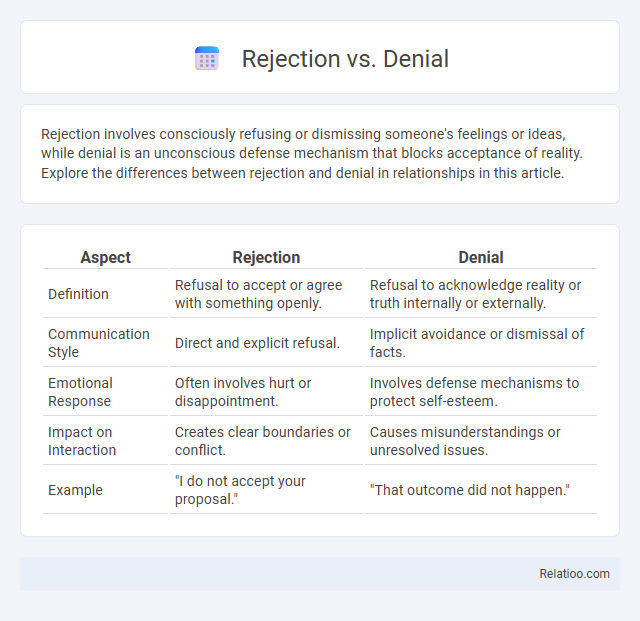Rejection involves consciously refusing or dismissing someone's feelings or ideas, while denial is an unconscious defense mechanism that blocks acceptance of reality. Explore the differences between rejection and denial in relationships in this article.
Table of Comparison
| Aspect | Rejection | Denial |
|---|---|---|
| Definition | Refusal to accept or agree with something openly. | Refusal to acknowledge reality or truth internally or externally. |
| Communication Style | Direct and explicit refusal. | Implicit avoidance or dismissal of facts. |
| Emotional Response | Often involves hurt or disappointment. | Involves defense mechanisms to protect self-esteem. |
| Impact on Interaction | Creates clear boundaries or conflict. | Causes misunderstandings or unresolved issues. |
| Example | "I do not accept your proposal." | "That outcome did not happen." |
Understanding Rejection and Denial
Understanding rejection involves recognizing it as an external response where your ideas, feelings, or actions are dismissed or refused by others, impacting your emotional state and social interactions. Denial, in contrast, is an internal psychological defense mechanism where you unconsciously refuse to accept reality or facts, protecting yourself from uncomfortable emotions or truths. Grasping the difference between rejection and denial helps you manage your reactions more effectively and foster healthier coping strategies.
Defining Rejection: What Does It Mean?
Rejection refers to the act of dismissing, refusing, or not accepting a person, idea, or proposal, often leading to feelings of exclusion or emotional pain. It signifies a conscious decision to decline or disapprove something based on specific criteria or personal judgment. Unlike denial, which involves refusing to acknowledge reality, rejection involves active refusal and is often a response to external stimuli or actions.
Defining Denial: A Psychological Perspective
Denial is a psychological defense mechanism where you unconsciously refuse to accept reality or facts, often as a way to protect yourself from emotional distress. Unlike rejection, which involves an external refusal or dismissal by others, denial occurs internally and distorts your perception of a painful truth. Understanding denial helps in recognizing how your mind shields you from overwhelming emotions, enabling healthier coping strategies.
Key Differences Between Rejection and Denial
Rejection involves a conscious decision to refuse or dismiss something based on evaluation, often leading to emotional response or conflict, while denial is an unconscious defense mechanism where an individual refuses to accept reality or facts to protect themselves from psychological discomfort. Key differences between rejection and denial lie in awareness and intent: rejection is a deliberate act with clear reasoning, whereas denial operates subconsciously to avoid acknowledging unpleasant truths. Understanding these distinctions is crucial in psychological assessments, communication, and conflict resolution strategies.
Emotional Impact of Rejection vs Denial
Emotional impact of rejection often manifests as feelings of worthlessness, sadness, and lowered self-esteem due to explicit dismissal or refusal. Denial, by contrast, triggers internal conflict and stress as individuals refuse to acknowledge reality, leading to avoidance rather than direct emotional pain. Unlike rejection, which is an external experience, denial primarily affects an individual's psychological state through self-deception and suppression of emotions.
Causes and Triggers of Rejection
Rejection arises primarily from social exclusion, perceived inadequacy, or conflicting values, often triggered by interpersonal interactions or failure to meet expectations. Denial involves an unconscious defense mechanism where individuals refuse to acknowledge reality, frequently activated by overwhelming stress or trauma. Understanding the distinct causes and triggers of rejection highlights its roots in emotional vulnerability and social dynamics, distinguishing it from denial's psychological avoidance.
Causes and Triggers of Denial
Denial often stems from the brain's defense mechanism to protect you from anxiety or distressing realities, triggered by traumatic events, overwhelming stress, or threatening information. Unlike rejection, which is an external response involving refusal or dismissal by others, and acceptance, denial prevents acknowledgment of facts internally. Understanding these causes helps identify when denial masks deeper emotional conflicts needing resolution.
How Rejection and Denial Affect Relationships
Rejection often leads to feelings of unworthiness and emotional distance, damaging trust and intimacy in relationships. Denial prevents acknowledgment of problems, hindering communication and growth between partners. Understanding how your rejection or denial impacts your relationship can help foster empathy and improve connection.
Coping Strategies for Rejection and Denial
Coping strategies for rejection and denial involve recognizing your emotions and practicing self-compassion to avoid internalizing negative beliefs. Developing healthy communication skills and seeking social support can help you reframe experiences and build resilience. Mindfulness techniques and cognitive restructuring empower you to challenge distorted thoughts related to rejection or denial, fostering emotional growth.
Moving Forward: Overcoming Rejection and Denial
Experiencing rejection and denial can create emotional barriers that hinder personal growth, but understanding their differences empowers one to move forward effectively. Rejection often involves an external dismissal, while denial represents an internal refusal to accept reality, both requiring distinct strategies for overcoming. Embracing resilience, seeking support, and reframing negative experiences facilitate healing and enable progress beyond these challenges.

Infographic: Rejection vs Denial
 relatioo.com
relatioo.com